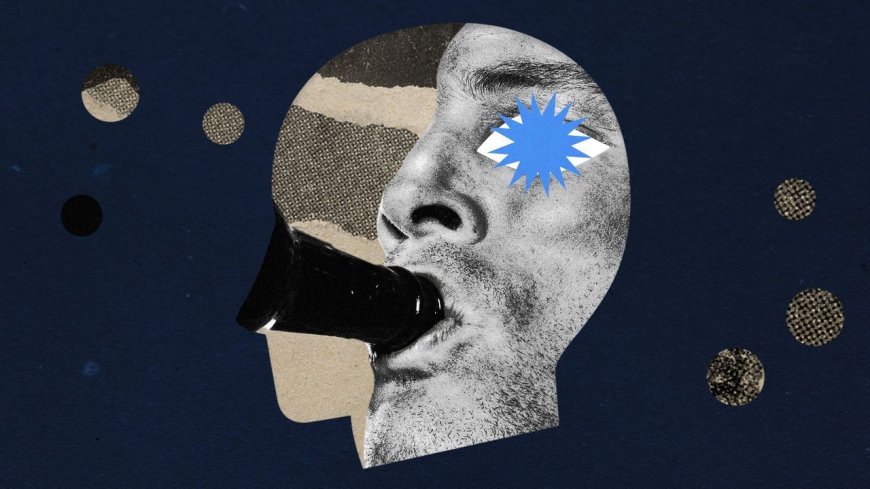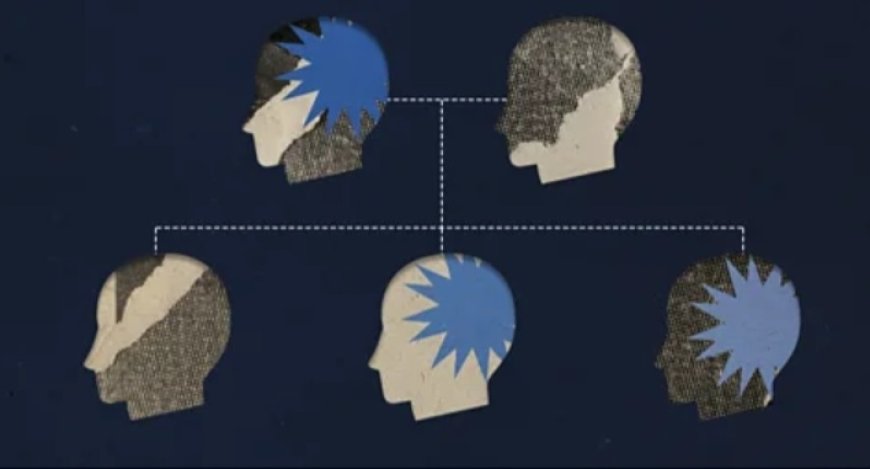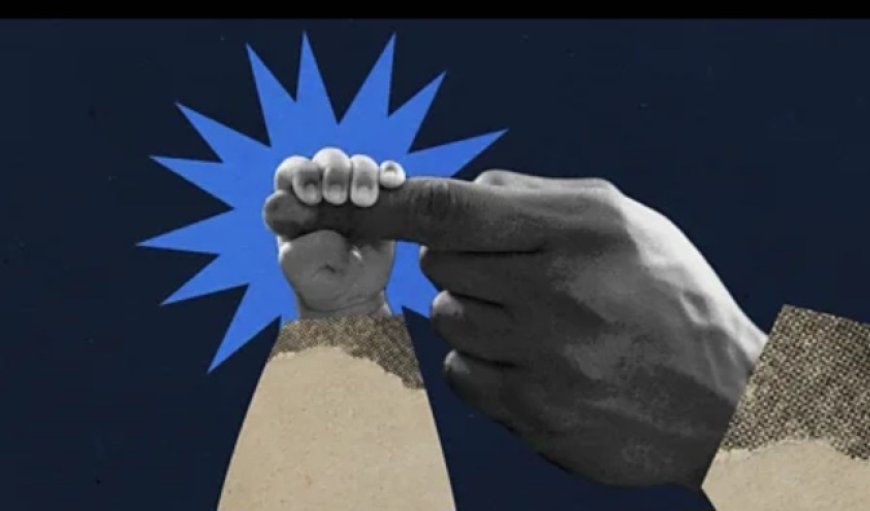Foetal alcohol syndrome: Why fathers need to watch what they drink too

A father's alcohol consumption has long been overshadowed by the focus on what a mother drinks. But that could be about to change following new research.
For more than 50 years, scientists have warned about the risks of drinking alcohol in pregnancy. Recent research has found that a mother's consumption of as little as one drink a week may affect a child's brain development, cognitive function and behaviour, and facial shape, while for decades, public health campaigns have repeatedly said that there's no safe amount of alcohol for mums to drink while pregnant.
The scientific consensus seems pretty clear – that prenatal alcohol exposure can cause a variety of problems (although some questions remain around the precise risk of light compared to heavy drinking, for example). Potential harms include neurodevelopmental impairments as well as particular facial features most commonly associated with foetal alcohol spectrum disorders (FASD), but also behavioural, cognitive and learning problems, such as speech delays. The effects cover a broad spectrum, which is part of why FASD is now the preferred description to "foetal alcohol syndrome", or FAS.
But as the risks of maternal alcohol consumption have become better-documented, another potential contributing factor to FASD has remained largely overlooked: how much the father drinks. Research on fertility and reproduction "has been so woman-focused, so maternal centric, that we've not really done our due diligence on the male side", says Michael Golding, a developmental physiologist at Texas A&M University who researches alcohol exposure and foetal development.
Yet researchers like Golding have suspected a paternal role for a long time. "For years now, we've been hearing stories from women who said, 'I never drank during pregnancy, but now I have an FAS kid – and my male partner was a chronic alcohol abuser'," he says. But such stories often were dismissed as mothers being forgetful, if not outright lying.
Recent research, however, raises an intriguing – and possibly game-changing – possibility: these mothers were right all along.
The idea that a father's alcohol consumption before conception could have an impact on the offspring may seem far-fetched. But recent population studies have found that babies whose fathers drank are at a higher risk for various poor health outcomes. One 2021 observational study of more than half a million couples in China, for example, found that the risk of birth defects – including cleft palate, congenital heart disease, and digestive tract anomalies – was higher if the father drank before conception, even when the mother did not drink. Another population study from China compared 5,000 children with congenital heart defects to 5,000 without. Again, while overall risk remained relatively low, it found that babies were nearly three times more likely to have a congenital heart defect if their father drank – defined as having more than 50ml (1.7fl oz) of alcohol per day in the three months before pregnancy – than if he didn't.

Paternal drinking has been associated with a range of developmental and cognitive issues in children (Credit: Serenity Strull/Getty Images/BBC)
It's important to note that the overall risk of birth defects still remained relatively low. In the 2021 study of various birth defects in China, for example, the most-impacted type – cleft palate – was found in just 105 babies of the 164,151 whose fathers drank. But this made cleft palate 1.5 times more likely among offspring of fathers who drank, than if the fathers didn't drink. "Our finding suggests that future fathers should be encouraged to modify their alcohol intake before conceiving to reduce foetal risk, considering a paternal drinking rate of 31.0% substantially elevated the risk of birth defects," the researchers wrote.
In July 2024, meanwhile, a study found that if fathers drank alcohol before conception, foetal growth appeared to be impacted.
Still, pinpointing whether the father's alcohol consumption actually caused these issues, as opposed to just being correlated with them, is difficult. While researchers of both studies controlled for confounding factors, such as if the father also smoked, it isn't possible to account for every single potential contributor. "Human studies are extremely messy – there are a lot of confounding factors there," says Golding. "What is the individual's diet? Do they exercise? There are a whole bunch of things there that make it incredibly difficult."
Meanwhile, setting up a randomised controlled trial (RCT), the gold standard of scientific research, isn't exactly an option when it comes to alcohol consumption and pregnancy. Even if it were ethical to tell some fathers to drink before conception, knowing it might have a negative impact on the offspring, it's unlikely that those who were normally teetotalers would start imbibing – or, in a theoretical control group, that those who frequently drank would completely stop.
But you can set up such an RCT for animals – specifically, mice.
Which is what Golding did. First, his team mapped the physical abnormalities associated with FASD in humans, such as smaller eyes and a reduced head size, on to a mouse model. Then they divided mice into groups where just pregnant mothers were given alcohol; where only the fathers were, pre-conception; and where both parents were. When they compared the features of the offsprings, they found a clear theme.
If a mouse mum consumed alcohol in pregnancy, her offspring showed some of the physiological symptoms of FASD that might be expected. But some changes in both cranial-facial patterning and in overall growth got worse when both parents drank. More surprisingly still, some abnormalities in the jaw, teeth spacing, eye size and eye spacing – all symptoms of human FASD – were more pronounced if the father drank compared to if the mother did.
Golding was taken aback. "I told my students to do it again," he says with a chuckle. They did and got the same outcomes, as they have every time they've replicated the study since.
In July 2024, his team published two more studies that underscored paternal alcohol effects on mice offspring. One found that, at midlife, those mice whose parents had both been exposed to alcohol had signs of increased cellular ageing in the brain and liver, a possible result of something else they found – markers of mitochondrial dysfunction, which occurs when the tiny organelles that produce energy within our cells stop working correctly.
This was true whether the alcohol-exposed parent was the mother or the father, but was most dramatic if both parents were exposed. This could help explain the results of observational studies on humans, where people diagnosed FASD have found to be hospitalised more often than those without FASD and have a life expectancy that is 42% that of the general population.
Golding has found evidence in mice that paternal alcohol use can lead to other changes in sperm that affect foetal growth.
Golding's team also found that the face shape of a mouse changed according to how much alcohol it's father had consumed. "The take-home message… is that male alcohol use is not going to have a yes/no impact on children; it will have graded effects where the more a man drinks, the worse the outcomes," he says.
Golding isn't the only researcher to find a link between paternal alcohol consumption and FASD-like outcomes in mice. Other studies have found that the offspring of alcohol-exposed male mice are more likely to show foetal growth restriction, metabolic defects and various differences in genetic expression, compared with mice that were not given alcohol.
At University of California Riverside, Kelly Huffman, a psychology professor with a background in developmental neuroscience, has been running experiments that have also found that the mouse offspring of alcohol-exposed dads are more likely to show certain outcomes.
The effects aren't as strong as when the mothers are given alcohol after conception. "Which makes sense – remember, these babies have never been [directly] exposed to alcohol," Huffman says. "But look." On screen, she pulls up images of the mouse offspring's neocortexes – the part of the brain involved in higher functions.
In control mice whose parents weren't exposed to alcohol, the primary somatosensory cortex – part of the brain that responds as it receives input from the mouse's whiskers – was in a distinctly different area to the primary visual cortex, which interprets visual cues. There was a clear boundary between them, with no overlap.
In the mice whose fathers, but not mothers, were exposed to alcohol, this region looks very different. "They're all mixed up," Huffman says.
Not only were the mice's brains organised differently, but their behaviour and motor skills differed too. Offspring of alcohol-exposed fathers were more likely to fall and take missteps, more hesitant to move around, and took longer to learn how to stay on spinning bars. "They don't improve at the same rate," Huffman says. "Their learning trajectory is a little slowed. That has to do, we think, with perhaps a little hyperactivity, and just problems with sensory motor integration."
Given that the pups aren't being directly exposed to alcohol in utero, how could this be happening? The most common explanation is a mechanism of genetic changes known as epigenetics. In this, bits of the genome are switched "on" or "off" without any physical changes to the DNA sequence.
Instead, they work through processes that modify the ability of the DNA being read by the cellular machinery, through processes such as DNA methylation, where chemical groups are attached to bits of the DNA molecule.
Research has found that alcohol disrupts the normal DNA methylation of sperm, which may go on to change how genes are expressed in the resulting embryo.
Golding has also found evidence in mice that paternal alcohol use can lead to other changes in sperm that affect foetal growth. He and his colleagues have found that chronic alcohol use alters the ratio of inherited fragments a type of genetic material called RNA in sperm.
While the epigenetic effects of paternal alcohol consumption is a relatively new field of research, the consequences of other paternal forms of exposure are better-documented. In both humans and in mice, there's particularly good evidence when it comes to smoking and the effect it has on inherited genetic material. The offspring of fathers who smoke are more likely to have birth defects, develop leukaemia, and have excess body fat, for example, possibly also due to epigenetic processes.

Even after pregnancy male drinking can still play a role in whether a mother consumes alcohol (Credit: Serenity Strull/Getty Images/BBC)
Despite the role that male drinking appears to play, most researchers agree a mother's alcohol consumption plays a larger role in foetal development than alcohol consumption by fathers. "The alcohol in the blood of the woman is passed directly across the placenta into the foetus, so that's a very direct effect" on development, says Elizabeth Elliott, a paediatrician and professor of child and adolescent health at Australia's University of Sydney. She has been a long-time FASD researcher and is the senior co-author of a recent academic review of FASD. "It affects the brain and the part of the brain that determines the development of the face, and it affects the development of all these organ systems, the lungs, in the heart, the ears and the eyes, and so on."
Still, the role that a father's drinking could play should not be ignored, Elliott and others say. While the research is still ongoing, Elliott believes it's time for public health campaigns to address this more directly. It's not just because the father's consumption might cause harm, she says. It would also have "real benefit… because we know that one of the key determinants of a woman drinking in pregnancy is if her male partner [if she has one] is drinking in pregnancy", she says. "It would be a win-win."
Based on the research so far, how much alcohol is "safe" for a father – not a mother – to drink if he knows his partner may conceive?
We don't have that data. But Golding, for his part, believes that a "very, very occasional drink" is probably fine – especially if a father reduces his drinking in combination with other factors that we know can improve health outcomes for offspring, like exercising and eating well. Still, he adds, "If it were my sons, I would tell them to stop drinking altogether."
While the exact impact of paternal drinking has yet to be teased out, researchers agree on one thing.
"There's this enormous burden that's put on women," says Golding. "But male health is important to foetal development. There is a responsibility of both parties here to support and provide for the health of the baby."
--
Source : BBC
























































